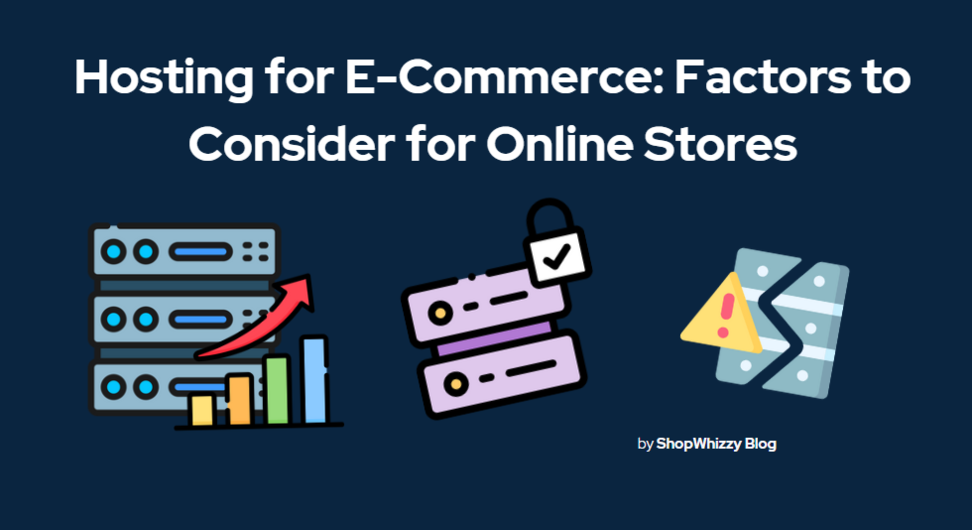Hosting for E-Commerce: Factors to Consider for Online Stores
-

- Blog
- Jan 6, 2025
-
1views
- Reading time: 5 minutes

Introduction
When setting up an online store, choosing the right hosting solution is one of the most important decisions you’ll make. The success of your e-commerce website depends on fast load times, reliability, security, and scalability. In this article, we’ll discuss the key factors to consider when selecting hosting for your online store, ensuring that your business runs smoothly and efficiently.
1. Types of Hosting for E-Commerce
There are several hosting options available for e-commerce websites, each with its advantages and limitations. The most common types are shared hosting, VPS hosting, dedicated hosting, and cloud hosting.
1.1 Shared Hosting
-
Shared hosting is the most affordable hosting option where multiple websites share the same server resources. While it’s cost-effective, it may not offer the performance or security needed for high-traffic e-commerce sites.
1.2 VPS Hosting
-
VPS (Virtual Private Server) hosting provides more dedicated resources than shared hosting. It’s a good option for growing e-commerce stores that need better performance and more control over their server environment.
1.3 Dedicated Hosting
-
Dedicated hosting gives you complete control over an entire physical server. It’s the best option for large e-commerce stores that experience significant traffic and require maximum performance, security, and customization.
1.4 Cloud Hosting
-
Cloud hosting uses a network of virtual servers, offering scalability, high uptime, and flexibility. It’s perfect for e-commerce stores that need the ability to scale resources based on traffic demands.
2. Performance and Speed
In e-commerce, site speed is crucial. Slow loading times can lead to high bounce rates and lost sales. When choosing hosting for your online store, ensure that the provider offers optimal performance for quick page load times.
2.1 Server Location
-
The location of your hosting server plays a major role in speed. Choose a hosting provider with servers located near your target market to reduce latency and improve site performance.
2.2 Content Delivery Network (CDN)
-
A CDN distributes your website’s content across multiple servers around the world, reducing load times by serving content from the server closest to the user. This is particularly beneficial for international e-commerce stores.
2.3 Caching Technology
-
Caching technology helps reduce server load by storing frequently accessed content closer to the user. Make sure your hosting provider supports caching to enhance your site’s speed.
3. Security Features
Security is a top priority for e-commerce stores, as you’ll be handling sensitive customer data and payment information. Your hosting provider should offer robust security features to protect your website from cyber threats.
3.1 SSL Certificates
-
Secure Sockets Layer (SSL) certificates encrypt the data transmitted between your website and users, ensuring that sensitive information, like credit card details, is secure. Look for a hosting provider that offers free SSL certificates.
3.2 Regular Backups
-
Frequent backups are essential for protecting your data in case of a disaster. Ensure that your hosting provider offers automated backups to restore your site quickly if needed.
3.3 Security Monitoring
-
Hosting providers with continuous security monitoring can help detect and prevent security breaches before they happen. Look for a provider that includes this feature as part of their package.
4. Uptime and Reliability
Your e-commerce site must be available to customers 24/7. Downtime means lost sales and a poor customer experience. Choose a hosting provider with a strong uptime guarantee and reliable service.
4.1 Uptime Guarantee
-
Look for hosting providers that offer at least a 99.9% uptime guarantee. This ensures that your site will be available nearly all the time, minimizing the risk of downtime.
4.2 Disaster Recovery
-
In the event of a server failure or attack, disaster recovery plans ensure that your site can be quickly restored. Ensure your hosting provider offers reliable disaster recovery solutions.
5. Scalability
As your e-commerce store grows, your hosting needs will evolve. Scalability ensures that you can easily upgrade your hosting plan to accommodate increased traffic and business expansion.
5.1 On-Demand Resource Scaling
-
Cloud and VPS hosting provide the flexibility to scale resources like CPU, RAM, and storage on-demand. This ensures that your store can handle high traffic during peak sales seasons without crashing.
5.2 Easy Upgrades
-
Look for a hosting provider that allows for seamless upgrades with minimal disruption. You should be able to easily move to a more powerful hosting solution as your store’s traffic grows.
6. Support and Customer Service
Responsive customer support is essential when running an e-commerce site. Choose a hosting provider that offers 24/7 customer support through various channels, such as phone, live chat, or email.
6.1 24/7 Availability
-
Since e-commerce sites run around the clock, having access to support whenever issues arise is critical. Ensure that your hosting provider offers 24/7 customer service.
6.2 Knowledgeable Support Team
-
Look for hosting providers with a support team that is knowledgeable about e-commerce platforms, such as WooCommerce, Shopify, or Magento. This will help resolve issues quickly and effectively.
7. Pricing
While price should never be the only factor when choosing a hosting provider, it’s important to find a solution that fits your budget. Make sure that the hosting plan offers the features and resources you need without overpaying for unused services.
7.1 Transparent Pricing
-
Ensure that your hosting provider offers clear and transparent pricing. Hidden fees can add up over time, so it’s essential to understand the full cost of your hosting plan.
7.2 Value for Money
-
Look for hosting plans that offer a good balance of features, performance, and price. Compare different providers to ensure you’re getting the best value for your money.
Conclusion
Choosing the right hosting solution for your e-commerce website is critical for success. Consider factors such as performance, security, scalability, and customer support to ensure that your online store runs smoothly and efficiently. Whether you opt for shared hosting, VPS hosting, or a more advanced solution like cloud hosting, make sure to select a provider that meets your specific business needs. With the right hosting, you’ll be well on your way to creating a successful e-commerce store.
Recommended Partner: Shopwhizzy
If you're looking for a reliable and top-tier hosting provider, we highly recommend Shopwhizzy. Shopwhizzy specializes in providing tailored hosting solutions for e-commerce businesses, with a focus on performance, security, and scalability. Their expert team offers 24/7 support and is equipped to handle the unique demands of e-commerce websites, ensuring your store runs seamlessly.
Why choose Shopwhizzy? Here are a few reasons:
-
Specialized E-Commerce Solutions: Shopwhizzy provides hosting specifically designed for online stores, ensuring that your site gets the resources it needs for fast loading times, security, and reliability.
-
Scalable Plans: As your e-commerce business grows, Shopwhizzy offers scalable hosting plans, allowing you to easily upgrade and expand without any downtime.
-
Security Focused: With automated backups, SSL certificates, and advanced security features, Shopwhizzy helps safeguard your online store against potential threats.
-
Expert Support: Their support team is available 24/7 to assist you with any issues, making sure your store is always online and functioning optimally.
Shopwhizzy’s reliable hosting services and excellent customer support make them the perfect partner for your e-commerce hosting needs. Visit Shopwhizzy to learn more and get started with hosting your e-commerce website.
